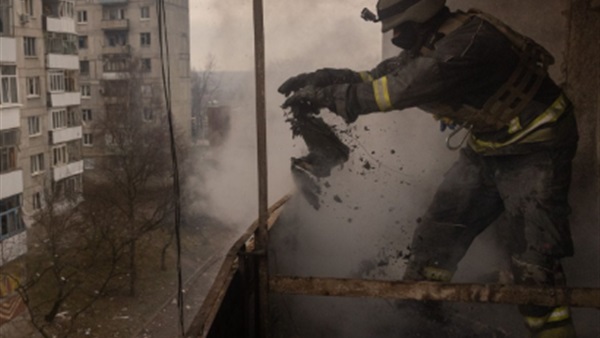Zelensky and Biden Discuss Ukraine’s Grid as Country Scrambles to Restore Power

Ukraine rushed to restore power supplies following the latest round of Russian attacks, while President Volodymyr Zelensky spoke with President Biden and other Group of Seven leaders following a flurry of weekend diplomacy aimed at strengthening sanctions on Russia.
As many as 1.5 million people were left without power in Ukraine’s southern Odessa region after Russian strikes late Saturday. Officials have warned it will take longer to restore power after the most recent attacks. Mr. Zelensky, speaking via videoconference to leaders of the G-7 nations, asked for more support over the next year, including by providing gas, modern tanks and more rocket artillery and long-range missiles.
G-7 and European Union leaders meeting on Monday reaffirmed their support for Ukraine. “We are determined that Russia will ultimately need to pay for the restoration of critical infrastructure damaged or destroyed through its brutal war,” leaders of the G-7 nations said in a statement following their meeting.
“We will maintain and intensify economic pressure on Russia and those who evade and undermine our restrictive measures,” the statement said, without providing details about how the pressure would be raised.
EU foreign ministers on Monday agreed to provide an extra 2 billion euros—worth about $2.1 billion—in funding for the European Peace Facility, a program used to reimburse member states for sending weapons to Ukraine. Most of the program’s funds have already been spent or earmarked for weapons deliveries to Ukraine.
In his nightly address Sunday, Mr. Zelensky said power supply had been partially restored in Odessa and other cities in the region. The situation is also difficult in Kyiv and western regions far from the front line between Russian and Ukrainian forces in the east of the country, he said.
“We are doing everything to achieve the maximum possible after the Russian hits,” he said.
The targeting of energy infrastructure has raised the costs of war for Ukrainians—and for Kyiv’s western allies—even as Russia struggles to make gains on the battlefield.
Mr. Zelensky spoke to Mr. Biden on Sunday after weekend calls with the leaders of France and Turkey and ahead of the G-7 and EU meetings on Monday. There are no official peace talks, but the U.S. and Russia have held a series of meetings in Turkey. On Monday, Russia’s RIA news agency quoted Russian Deputy Foreign Minister Sergei Vershinin as saying that Moscow doesn’t yet see a “constructive” approach from the U.S.
The White House said Mr. Biden highlighted U.S. support for strengthening Ukraine’s air defense against Russian attacks, including $275 million in ammunition and equipment that comprises systems to counter drones. Last month, the U.S. also announced $53 million to support energy infrastructure.
Monday’s EU allocation overcame the reluctance of Hungary, which had pushed for new funding to be disbursed more evenly to a number of countries and not be channeled mainly to Ukraine, diplomats said.
The port city of Odessa was an early target of Russia’s invasion, which sought to control Ukraine’s southern coast, denying Kyiv access to the sea. But Ukrainian forces blocked their advance, and Russia’s recent withdrawal from the southern Kherson region has put Odessa further out of reach. Mr. Zelensky has said that Odessa has had some of the most frequent power outages, but the work on restoring electricity for the general population was constant.
At a briefing in Odessa, Ukraine’s Defense Minister Oleksiy Reznikov said Russia was waging a war against the civilian population because it was unable to gain advantage on the battlefield. “Their goal is to plunge us into darkness and cold during the winter period so that we surrender and give up, so that we can’t maintain order, and so that we lose our stability,” he said. “And then, according to their plan, we might seek negotiations.”
Mr. Reznikov said Russia was running low on resources including missiles, expressing confidence that Ukraine would prevail.
The campaign targeting Ukraine’s energy infrastructure began in October after Gen. Sergei Surovikin was put in charge of Russia’s war in Ukraine. Using barrages of missiles and Iranian-made drones to overwhelm Ukraine’s patchwork of air defenses, Russia has repeatedly hit both power-generation facilities and the transmission system. The latest attacks indicate that Russian stocks of Iranian-made drones have been replenished by Tehran.
Ukrainian Air Force spokesman Yuriy Ihnat said Russia had recently been deploying drones at night, when it is more difficult to shoot them down. During the day, the drones are more easily visible and can be downed using machine guns or small arms, while at night, antiaircraft missiles must be used to intercept them, he said.
Russia heavily bombarded Ukrainian-held parts of the Kherson region on Monday, killing two people and wounding five others, according to the head of the regional military administration, Yaroslav Yanushevych. After retreating from the provincial capital and surrounding areas last month, Russian forces set up defensive positions on the eastern bank of the Dnipro River from where they have repeatedly shelled the city, marring Ukraine’s victory.
Mr. Zelensky also approved sanctions against seven clergymen as Ukraine clamps down on the activities of the Orthodox Christian denomination historically linked to Moscow.
The Ukrainian Orthodox Church, canonically linked to the Moscow Patriarchate, is the most important remaining source of Russian cultural-and-religious influence in the country. Previously, it was the dominant of the country’s two main Orthodox denominations before many faithful and parishes switched to the rival Orthodox Church of Ukraine.
During a series of raids in recent weeks, Ukrainian security services have found evidence of Ukrainian orthodox priests possessing Russian citizenship, contacting Russian intelligence agents and owning literature denying the right of Ukraine to exist.







